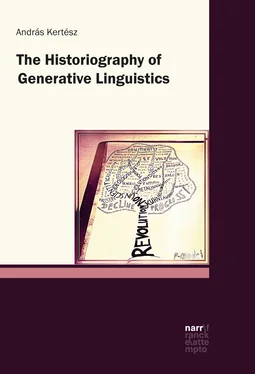Only theories conforming to the norms of rationality can be regarded as scientificscientific.
Rationality is governed by principles that do not depend on communities and do not change in time .
The ›context of discovery‹ and the ›context of justification‹ should be distinguished. The reason why this distinction was introduced is the conviction that ›the context of discovery‹ – that is cognitivecognitive factors such as scientificscientific creativity and intuition, as well as the historical and socialsocial factors that may influence the process of theorytheory formation – can neither be revealed nor controlled. Therefore, rational reconstruction deems them irrelevant. It is solely certain characteristics of the final product of the discovery process – i.e. the static logicallogic structure and the empirical foundation of closed scientific theories – which can be assigned significance during the justification of theories. Consequently, the philosophy of sciencephilosophy of science aims at the posterior justification of well-developed scientific theories with the help of their rational reconstruction.
Empirical scientificscientific theories are deductivedeductive (axiomatic) systems .
KuhnKuhn, Thomas S. challenged this view by arguing that the nature of scientificscientific knowledge is very different from what the standard view of the philosophy of sciencephilosophy of science assumed. He argued that the ways in which scientific inquiry works cannot be derived from allegedly predetermined, unchanging and absolute principles of rationality; instead, the patterns which scientific inquiry follows are changeable and therefore are to be examined within their socialsocial and historical context. The result of the historical development of scientific knowledge and the historical process itself are closely interwoven. Therefore, the distinction between the context of discovery and the context of justification must be given up, and, in turn, the nature of science can be better understood by revealing the historical processes shaping it.
According to KuhnKuhn, Thomas S., the development of disciplines should be divided into two major stages (Kuhn 1970 [1962]: 11 ff). In the immatureimmature stage each scholar builds up the particular discipline from its basics. Accordingly, at that stage there are many rival views on the subject, aim and methodologymethodology of the research; therefore, research in the immature stage is pluralistic, and lacks integrity in terms of ontology, methodology and the foundations of science. In the maturemature stage, however, one of the rival views emerges as the dominant one, and becomes the model to be followed in research in the particular field (Kuhn 1970 [1962]: 16f.). Kuhn termed such a pattern a paradigmparadigm . It is the emergence of the first paradigm that makes a discipline mature.2
The research carried out within a particular paradigmparadigm is called normal sciencesciencenormal . KuhnKuhn, Thomas S. compares normal scientificscientific research to ›puzzle-solving‹, the essence of which is that the range of problems, the methods of their solution and the boundaries of the acceptable solutions are defined by patterns codified in the research community. Scholars should refrain from significantly diverging from these patterns. This kind of normal science is practiced by scholars working in the well-developed natural sciencesciencenaturals. However, socialsocial sciences have been stuck in a state of pluralismpluralism with a great variety of possible scientific methods, basic hypotheses and views on the foundational questions of the particular discipline (Kuhn 1970 [1962]: 15, 20, 37, 160). They have not yet created their first paradigm , hence they are immatureimmature.3
During research in the maturemature stage, however, anomaliesanomaly tend to accumulate. Sooner or later such anomalies lead to a crisiscrisis (KuhnKuhn, Thomas S. 1970 [1962]: 66ff.). Anomalies are problems that cannot be solved by conforming to the previously accepted patterns. They suggest the need for the modification or rejection of those patterns, as well as the need for the extension of the acceptable set of problem solutions. As a result of the crisis, rival views to the paradigmparadigm appear, one of which will emerge and spark a scientificscientific revolutionrevolutionscientific . As a result of the scientific revolution, the new system of views becomes firmer, and a new paradigm replaces the previous one. Both an outstanding personality and textbooks that communicate the new patterns to the younger generation contribute to the victory of the new paradigm.4 The views advocated by representatives of the old and the new paradigm are incommensurableincommensurable , which means that their followers act in ›different worlds‹ and they do not even understand each other.5 Since the generation supporting the new paradigm is not able to change the views of the older generation backing the old one, the paradigm shift takes place only after the representatives of the old paradigm have died out (Kuhn 1970 (1962]: 150).
KuhnKuhn, Thomas S.’s work generated extraordinary responses among historians and philosophers of science. Not only because of the originality of his thought, which questioned the long approved views on science, but also because he presented his arguments in an essayistic manner, with ambiguous wording and vague terminology. For instance, he did not define precisely the term ›paradigmparadigm‹ and the criteria of a paradigm shift. However, for the purpose of later references in the following chapters, we summarize the above-mentioned terms in the following list:
The difference between maturemature and immatureimmature stages in the historyhistory of a discipline;
Paradigm as a coherent research traditionresearchtradition;
Normal science as puzzle-solving;
The dominance of a single paradigmparadigm in a discipline;
The emergence of anomaliesanomaly within normal sciencesciencenormal;
The crisiscrisis of the old paradigmparadigm;
Textbooks and outstanding individuals central to the dominance of the paradigmparadigm;
Scientific revolution;
The incommensurabilityincommensurable of the old and the new paradigmparadigm;
The disappearance of the followers of the old paradigmparadigm.
Part 1: Metahistoriographical overview
2 From ›scientificscientific revolutionrevolutionscientific‹ to ›unscientific revolutionrevolutionunscientific‹
2.0 Introduction
The systematization of the approaches surveyed in this chapter is based on the following three criteria:
First of all, we will restrict the term ›generative linguistics‹ to ChomskyChomsky, Noam’s work and use it in the sense of ›Chomsky’s generative linguistics‹.1 The sections discuss diverse solutions to (P) with respect to Chomsky’s publications that have been regarded as milestones and are substantially referred to in the historiographicalhistoriography literature: Syntactic Structures Syntactic Structures (2.1), Aspects Aspects of the Theory of Syntax (2.2.), The Sound Pattern of English (2.3), Lectures on Government and Binding (2.4) and finally, the Minimalist ProgramMinimalist Program (2.5). Each section devoted to the diverse historiographical approaches to these works will start with an introductory subsection which sketches basic features of Chomsky’s work at issue. These sketches serve as background information for those readers who are less familiar with generative linguistics and thus they prepare the understanding of the historiographical approaches, which presuppose this knowledge; nevertheless, they are not intended as a comprehensive introduction to the theorytheory and practice of generative linguistics. By doing this, we will try to present these pieces of information in as value-free a manner as possible2 – in order to do so, the very concise summaries of basic tenets will be illustrated by numerous quotations from Chomsky’s works at issue, so that we let him speak, rather than present the interpretations of the present author. Later, we will see how the historiographical literature, in many different ways, enriches them by its evaluations, its intellectual and socialsocial preferences, and its legitimizing attitudes.
Читать дальше












